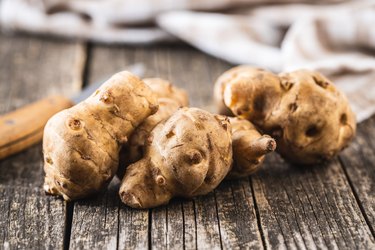
Having diarrhea after a meal can be uncomfortable and worrisome, especially if you notice a different color. If you've ever had bright yellow, watery diarrhea, you might wonder if it's a symptom of a particular condition, like irritable bowel syndrome (IBS). Here's what yellow loose stool may mean.
Is Yellow Poop Irritable Bowel Syndrome?
Video of the Day
Stool is brown because of the bile made in your liver, according to Kelly Issokson, RD, CNSC, registered dietitian at the Cedars-Sinai Nutrition and Integrative IBD Program in Los Angeles, California. Yellow diarrhea after meals is not a common symptom of IBS, she says.
Video of the Day
"If you have yellow diarrhea, it could be a sign of a liver disorder, infection or gallbladder disease, and you should talk to your doctor," Issokson says.
Yellow diarrhea signals excess fat in your stool and could be due to celiac disease or another disorder of digestion that interferes with absorption, called a malabsorption disorder, according to the Mayo Clinic. There is one possible link to IBS — a condition called bile acid malabsorption (BAM), which may occur in about one-third of people with IBS, per the Mayo Clinic.
What to Eat for IBS Diarrhea
Yellow diarrhea is not typically a symptom of IBS, but watery diarrhea can be, according to the National Institute of Diabetes and Digestive and Kidney Diseases (NIDDK). The cause of IBS is not known, but a doctor can diagnose it from your symptoms of diarrhea, constipation or both. Diet is an important part of managing IBS and certain best practices for IBS can include:
- Getting more fiber in your diet
- Avoiding foods with gluten
- Following a low-FODMAP diet
"Soluble fiber from foods like oranges, carrots, oats, legumes and beans slow down digestion, help your body absorb fluids and reduce symptoms in people with IBS diarrhea," Issokson says. "Some people get relief from foods like rice, cooked vegetables, soup and yogurt, which is naturally low in lactose. Common triggers for IBS diarrhea include: eating large food portions, spicy foods, fatty foods and foods rich in lactose, fructose, caffeine, artificial sweeteners or alcohol."
It can be hard to pinpoint which foods trigger IBS diarrhea, according to the American Society for Gastrointestinal Endoscopy (ASGE). Food triggers vary widely for people with IBS. Common foods to avoid include those that produce gas, as well as alcohol and caffeine. The American Gastroenterological Association (AGA) adds that dairy products and high-fat foods can also be problems for some people, but not all, so it makes sense to keep a diary of foods that trigger your symptoms so you can avoid them.
Probiotics may be recommended, but researchers are still studying their use, according to the NIDDK. "The American Gastroenterology Association does not recommend probiotic supplement use in IBS, but there is growing evidence that prebiotics may be helpful for some people. Prebiotics are foods that promote the growth of beneficial bacteria in your gut, which have been found to reduce IBS symptoms," Issokson says.
Prebiotics foods include fruits and vegetables, according to the Cleveland Clinic, especially:
- Boiled potatoes
- Unripe bananas
- Jerusalem artichokes
Get Help for Your IBS Diet
As you can see, finding the best diet for IBS can be confusing, and the best diet for you is customized to you and your symptoms and triggers.
"Most people will benefit from working with a dietitian experienced in nutrition for IBS," Issokson says. "This is especially important if general diet and lifestyle changes are not helping and you want to try an elimination diet, like a low-FODMAP diet. A low-FODMAP [plan] can be difficult to follow on your own and can lead to nutrient imbalances, food fears and anxiety."
Issokson recommends searching for a dietitian using the databases from the International Foundation for Gastrointestinal Disorders or the Academy of Nutrition and Dietetics.
There are also lifestyle changes you can do on your own. These include, according to the NIDDK:
- Increasing your physical activity
- Reducing your stress
- Getting enough sleep
"Simple things like chewing your food slowly and completely, not skipping meals and eating smaller, more frequent meals can also make a big difference," Issokson says.
Read more: Your Ultimate Guide to Living Well With IBS
- National Institute of Diabetes and Digestive and Kidney Diseases: “Irritable Bowel Syndrome (IBS): Definition & Facts”
- American Gastroenterological Association: “Irritable Bowel Syndrome (IBS)”
- Kelly Issokson, MS, RD, CNSC, Cedars-Sinai Nutrition and Integrative IBD Program, Los Angeles, California
- Mayo Clinic: “Stool Color: When to Worry”
- Mayo Clinic: “Identifying Diarrhea Caused by Bile Acid Malabsorption”
- American Society for Gastrointestinal Endoscopy: “Understanding Irritable Bowel Syndrome With Diarrhea (Also Known as IBS-D)”
- Cleveland Clinic: “Prebiotics vs. Probiotics: What’s the Difference?”
Is this an emergency? If you are experiencing serious medical symptoms, please see the National Library of Medicine’s list of signs you need emergency medical attention or call 911.